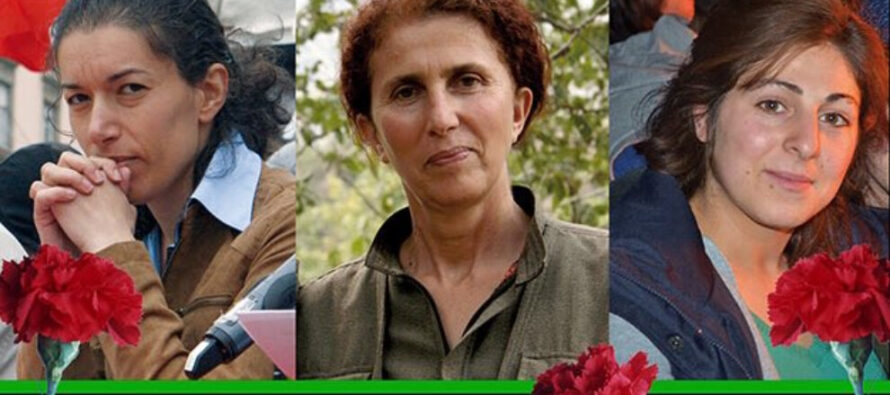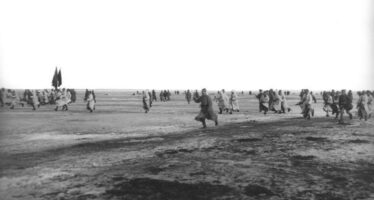Sakine, Fidan and Leyla: The search for justice continues

![]()
Eight years ago today the bodies of three revolutionary Kurdish women were found at a community centre in a Paris suburb.
Kurdistan Workers Party (PKK) co-founder Sakine Cansiz, Fidan Dogan and Leyla Saylemez had been shot in the head in what bore all the hallmarks of a targeted assassination.
According to French authorities, there was no sign of a forced entry, meaning that the murderer either knew the entry code or was let in by the victims.
But we may never know the truth — the main suspect Omer Guney, who was arrested soon after the killings, died in prison just days before his trial was due to start.
His death leaves the killings shrouded in mystery, with allegations of a cover-up and state murder.
The murdered women were key figures in the Kurdish movement. Dogan worked at the Kurdish Information Centre in the French capital and was believed to be close to PKK leader Abdullah Ocalan.
Comments made by then French President Francois Hollande claiming that he had regular meetings with one of those killed — believed to be Dogan — drew the ire of Turkey’s President Recep Tayyip Erdogan.
In a televised appearance he demanded answers from Hollande as to why he had been “in communications with these terrorists.”
And he raged against those in Europe whom he accused of harbouring “PKK terrorists” on their soil.
Saylemez was a Kurdish rights activist who, like so many of her contemporaries, had been charged in Turkey with “membership of a terrorist organisation.”
But the main target of the killings is believed by many to have been the revolutionary leader Sakine Cansiz.
Cansiz, known as Sara, has iconic status in the movement and was co-founder of the Kurdistan Workers Party (PKK) in 1978. She remains an inspiration to women fighting for liberation across the world today.
People’s Democratic Party (HDP) honorary president Sebahat Tuncel explained how she grew up hearing about Cansiz, how she had resisted and spat in the face of her torturers.
“She was a very important name for Kurdish women. She was a feminist and her struggle was always double-edged: against male dominance and for Kurdish rights,” Tuncel said.
Born to an Alevi family in the Kurdish city of Dersim, she became active in the Kurdish liberation movement after she met activists as a teenager.
She first encountered PKK leader Abdullah Ocalan at a university study group and began debating ideology, attending and organising meetings and marches.
Cansiz soon ran into trouble with the authorities and was arrested in Izmir in western Turkey before returning to engage in education on how to organise the Kurdish liberation movement and the revolutionary struggle.
She was arrested again as part of the 1980 military coup and sentenced to 24 years in prison for establishing a branch of the PKK in Elazig.
She spent 10 years in the notorious Diyarbakir prison, where torture and sexual assault were commonplace. It was known for its brutality, with electric shocks and beatings taking place on a daily basis.
Not a single woman during that time turned informant, something that is largely credited to the strength and resilience that Cansiz inspired in others.
For the Kurdish community there is a strong suspicion and belief that the murders were ordered or carried out by the Turkish intelligence services (MIT).
Guney was caught with blood on his shoes and DNA linking him to the crime scene, with investigations revealing he was in the Kurdish Information Centre at the time the murders are believed to have been committed.
He is thought to have had right-wing Turkish nationalist sympathies, infiltrating the Kurdish movement as a driver and taking on other tasks.
Guney had taken photographs of the personal details of around 300 members of Kurdish organisations which were sent and then deleted from his phone.
And a voice recording posted on the internet by an anonymous source is alleged to be that of Guney speaking to unidentified MIT officers about the assassination plans.
Also included in the investigation file are papers which claim that the “execution order” was given by four MIT administrators.
The document, entitled “Ref: Sakine Cansiz, Codenamed Sara” is alleged to have been signed by MIT officials Yuret, U.K. Ayik, S. Asal and H. Ozcan.
It alleged that an operative known as “Legionnaire” had been paid €6,000 to prepare the assassinations and had met MIT officers in Turkey prior to the killings.
Turkish intelligence dismissed the evidence, claiming the document was not genuine. They insist the killings were carried out by an individual who wanted to derail the peace talks which it was revealed were taking place between MIT agents and Ocalan just weeks before the shootings.
Some have suggested that it may have been an internal PKK feud targeting Cansiz, an important figure in the Kurdish movement.
However in January 2018, the Kurdistan Communities Union (KCK) executive co-presidency issued a statement asserting the name of the man who planned the Paris killings as Sabahattin Asal, a high-ranking MIT official who had also taken part in the peace negotiations with Ocalan.
The statement claimed that two MIT officers captured by the PKK confessed that Asal was the person who masterminded the murders.
The KCK said the admission and the role of Asal in the Imrali peace talks shed new light on the role of the Turkish government in the killings and its real policy toward the so-called Kurdish question.
It would not be the first time that Turkish intelligence services have been suspected or accused of playing a role in extrajudicial killings.
Those fears took on a new significance in January 2018 with allegations made by HDP MP Garo Paylan of a new wave of assassins being sent across Europe with a hit list, including prominent academics, journalists and political opponents.
The attempted murder of outspoken Kurdish footballer Deniz Naki, who was shot at while driving on a motorway in Germany three years ago yesterday (Fri), adds fuel to those claims.
Naki believes that he was targeted by either a Turkish government agent or right-wing Turkish nationalists.
In October last year it is alleged that operatives from the National Intelligence Organisation (MIT) were behind a plot to assassinate Democratic Union Party (PYD) Salih Muslim and Aldar Khalil of the executive committee of the Democratic Society Movement (Tev-Dem).
And in December Italian citizen Feyyaz Öztürk claimed he had been blackmailed by MIT to kill or hurt Berivan Aslan, an Austrian regional politician of Kurdish heritage.
Investigators have not been able to identify the perpetrators of the Paris killings, however the evidence so far points to Ankara, and specifically the Turkish intelligence services.
It is believed to be the first time that a state has been an official suspect in a “political murder.”
The implication in the indictment is clear. “There are legions of indications that give cause to think that the MIT was involved with the inciting of the murders and carrying them out.
“It was discovered that Omer Guney was involved in spying activities and that he was secretly in touch with a couple of spies in Turkey,” it reads.
This begs the question: did Guney know too much? There was no evidence available to suggest that Guney had been unwell prior to his sudden death, which came just weeks before he was due to take to the stand.
If his alleged illness had been known, then why did prosecutors not bring him to trial sooner?
Rumours are circulating that Guney may have been killed to put an end to the case and sweep it under the carpet before the Turkish state became more deeply implicated and secrets unravelled.
However lawyer for the families Antoine Comte has consistently said that the case is not over yet and he wants to question MIT officers who have been implicated in the murders.
“It is almost impossible right now to extradite these people with finalised crimes from the country they are in,” he explained.
Comte said that the evidence and statements from the MIT officers held by the PKK could be “very important for the case” and may confirm the documents held by the French prosecutor.
France reopened the case in 2019. But a new rapprochement between Paris and Ankara announced yesterday could see the two nations close ranks once again to deny justice and leave the deaths shrouded in mystery.
French intelligence has sought to close the case despite evidence it supplied regarding a prison meeting held between Guney and Ruhi Seman, an associate and work colleague when he lived in Germany.
This meeting was notable as it was the first the murder suspect was allowed while in prison. Even his family had not been permitted a visit at that stage.
But despite clear evidence the Guney passed him a note detailing a bid to break out of prison, which it is believed he wanted to be handed to MIT, Semen has never been questioned.
The international conspiracy has widened as ANF reported yesterday(Friday) that Semen remains active in German-based organisations associated with MIT, including the Turkish-Islamic Union of Religious Affairs (DITIB).
DITIB operates some 900 mosques in Germany, and is alleged to be the most important part of the Erdogan regime’s intelligence network.
Semen also operated the Türkspor Hausham sports club which is used by Turkish nationalists and is alleged to have trained Guney in how to carry out assassinations of Kurdish politicians there.
The German government has confirmed that Guney was found with an unlicensed weapon during a police road check in 2005 and on a second occasion in 2011 officers caught him carrying teargas and a knife.
The truth about the killing of the trio may never be known, but the fight for justice and accountability continues.
The women who were murdered in Paris are the inspiration for those who are leading the fight against Isis in Syria and the brutal and tyrannical dictatorship of Erdogan in Turkey.
Kurdish women launched the 100 Reasons to Jail the Dictator campaign last November compiling a comprehensive dossier and a petition in support of a bid to see Erdogan brought to trial in The Hague and charged with war crimes.
It will run until March 8, International Women’s Day, and they are calling for support for their campaign for Turkey’s misogynistic and tyrannical leader to be held to account.
We must stand for justice for Sakine Cansiz, Fidan Dogan and Leyla Saylemez and all progressives must rally to the cause of the revolutionary women in Rojava, in Turkey and across the world.
Jin, Jiyan, Azadi (women, life, freedom).
(A version of this article first appeared in the Morning Star newspaper)
Source: ANF https://anfenglish.com/features/sakine-fidan-and-leyla-the-search-for-justice-continues-49217
Related Articles
IRLANDA: LE PROPOSTE E LA SCOMMESSA DEL SINN FEIN
![]()
Maeve Kelly. Campagna elettorale per le suppletive nella Contea di Donegal, presentazione delle proposte alternative alla finanziaria proposta dal governo
3 August must be recognized as the “International Day of Action Against Femicide and Genocide”
![]()
This week marks the 6th anniversary of the August 3, 2014 massacre in Iraq’s Sinjar region of the Yazidi community by the so-called Islamic State as they swept into northern Iraq in 2014
The Party of Kurdistan’s “Third Revolution”
![]()
The PKK’s engagement with socialism is the search for an answer to the question of why the “revolutionary spirit” failed to find institution until now



